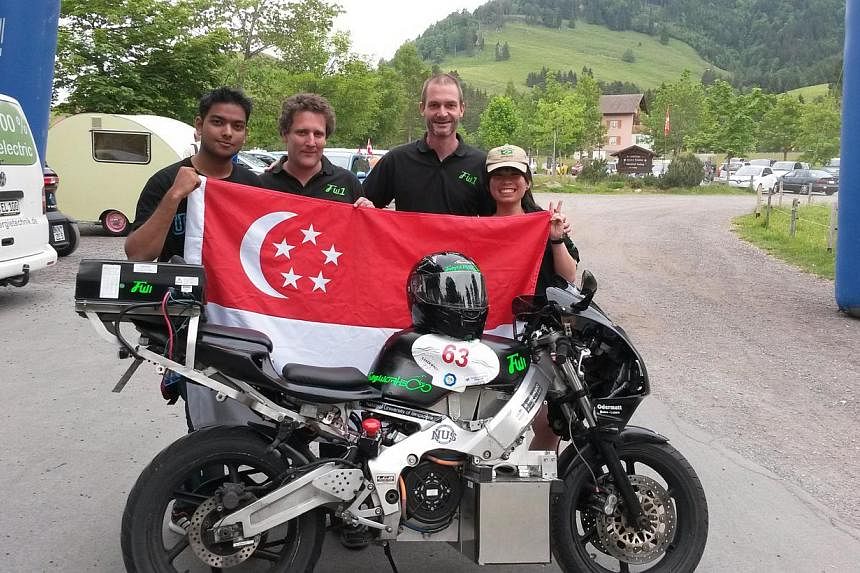Computing professor Martin Henz, 47, had always been interested in motorbikes and started riding regularly seven years ago when a National University of Singapore (NUS) colleague gave him an old motorbike.
"From then on, I've preferred two-wheeled transport," said Prof Henz, whose duties include taking charge of residential life under the University Scholars Programme (USP).
With about 16 students from the USP and engineering faculty, he has been working on a project from 2012 to convert a 10-year-old Honda motorbike to an electric vehicle to achieve fuel efficiency. They replaced the petrol engine of the bike, a Honda CBR400RR, with an electric motor, a battery system and controller.
Their work paid off: From May 31 to June 8, the converted Honda motorbike was part of the World Advanced Vehicle Expedition, the biggest electric vehicle rally worldwide, and completed the trek in third place out of 13 two-wheelers.
The NUS team tied with a team from France. Of the four teams placed in the first three positions, the NUS team was the only one with a converted motorbike.
The expedition, which went from Germany to Switzerland, was a chance for Prof Henz to stress test the bike.
The bike took up to two hours to fully recharge, and could travel up to 80km on sloping terrain, and 100km on flat land.
The result was also a testament to the robustness of the vehicle - something the team could not test here, as the motorbike was not approved to ride on roads here.
As the Honda bike was not meant to be an electric one, the team had to work within the constraints of the vehicle's frame, said Prof Henz.
For instance, it was difficult trying to find the space to fit in a sufficient number of batteries to power the vehicle. But it was a perfect learning opportunity for engineering students, he said. "Such constraints are ubiquitous in the working life of an engineer, so electric conversion provides real-world experience to aspiring engineers."
Among the students working on the bike was 21-year-old student Ayush Kumar Pacheriwala, now reading a double degree in industrial and systems engineering and business.
Mr Ayush, also in the USP, remembers clocking up to 20 hours in a workshop in the residential college to make sure the new parts for the bike fitted exactly where they should.
"Everything had to be very precise. If any part was bigger by just one millimetre, it would not fit in the bike," said the student, who will be in his third year when the new semester begins in August.
For the team, the rally was a step forward in helping to get road approval here for the bike.
To qualify for the competition, the team had applied for road approval in Switzerland. With that, it might now be easier for the Land Transport Authority to approve the bike for daily use on roads here, said Prof Henz.
The long-term goal is to put together a conversion kit for other motorbikes that can convert them to an electric ride in just one day.
Said Prof Henz: "Electric individual transportation seems inevitable in the 21st century. It is the most promising propulsion technology for moving away from fossil fuels, whose use is becoming more and more problematic."


